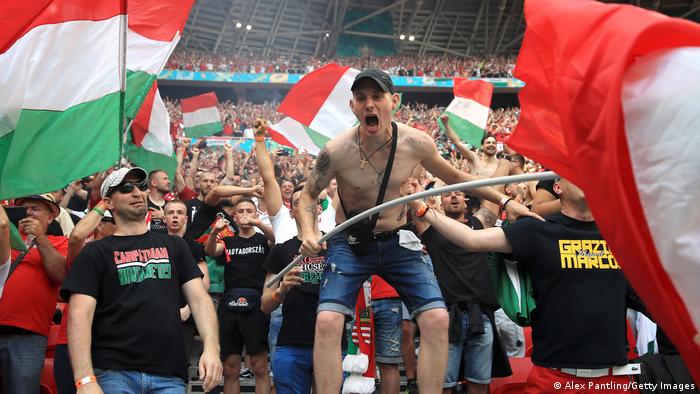
Ahead of Germany’s third Euro 2020 group game against Hungary in Munich on Wednesday, city councilors in the Bavarian capital have put forward a motion to have the arena illuminated in rainbow colors.
“[Munich] supports diversity, tolerance and genuine equality in sport and in society,” reads the joint motion from all six factions on Munich’s city council, addressed to Munich mayor Dieter Reiter.
“On the occasion of the match between Germany and Hungary, the council wishes to send a visible message of solidarity to the LGBT community in Hungary which is suffering under recent legislation passed by the Hungarian government.”
On June 15, the Hungarian parliament voted 157-1 in favor of new legislation which outlaws the sharing of information that is considered to promote homosexuality or non-binary gender identities among under-18s.
“This law represents a new nadir in the disenfranchisement of lesbians, gays, bisexuals and transgender people, the latest in a series of measures over the years which constitute a systematic restriction of the rule of law and basic freedoms in Hungary,” read the motion from the Munich councilors.
It also said the new Hungarian law contravened the EU’s Charter of Fundamental Rights, the UN’s Convention on the Rights of the Child, the jurisdiction of the European Court of Human Rights and the aims of the EU Commission’s strategy on LGBTIQ equality.
“In this situation, so soon after the passing of this legislation, the German national team’s fixture against Hungary offers a public platform on which to send the message that Munich stands for a diverse and tolerant society,” concluded the motion. “Sport, and football in particular, also stands for these values.”
Pro-LGBT+ and anti-LGBT+ messages in football
Campaigns and messages in support of LGBT+ rights are commonplace in German football, goalkeeper Manuel Neuer wearing a rainbow-colored captain’s armband during Tuesday’s defeat to France, for example. During the regular season, Bundesliga clubs and their supporters regularly take part in similar initiatives, while Hungary and RB Leipzig goalkeeper Peter Gulacsi also recently spoke out publicly in support of same-sex marriage.
Generally, however, the fan culture at domestic games and also surrounding the national team in Hungary is dominated by right-wing ultra and hooligan groups, who have traditionally made no secret of their anti-Semitic and anti-gypsy views.
At each of Hungary’s two group games in Budapest, the fan blocks behind the goal were occupied by the black-shirted “Carpathian Brigade” – a neo-Nazi ultra group made up of members of extreme-right groups from across Hungarian football, united behind the national team.
During the 0-3 defeat to Portugal on June 15, the same day the anti-LGBT legislation was passed, the Carpathian Brigade displayed anti-LGBT+ banners and sang anti-LGBT+ chants inside the stadium, which UEFA are investigating.
Ahead of Saturday’s 1-1 draw with France, members of the group marched to the Puskas Arena behind an anti-kneeling banner, a reference to some national teams, including England, “taking the knee” against racism and discrimination.
